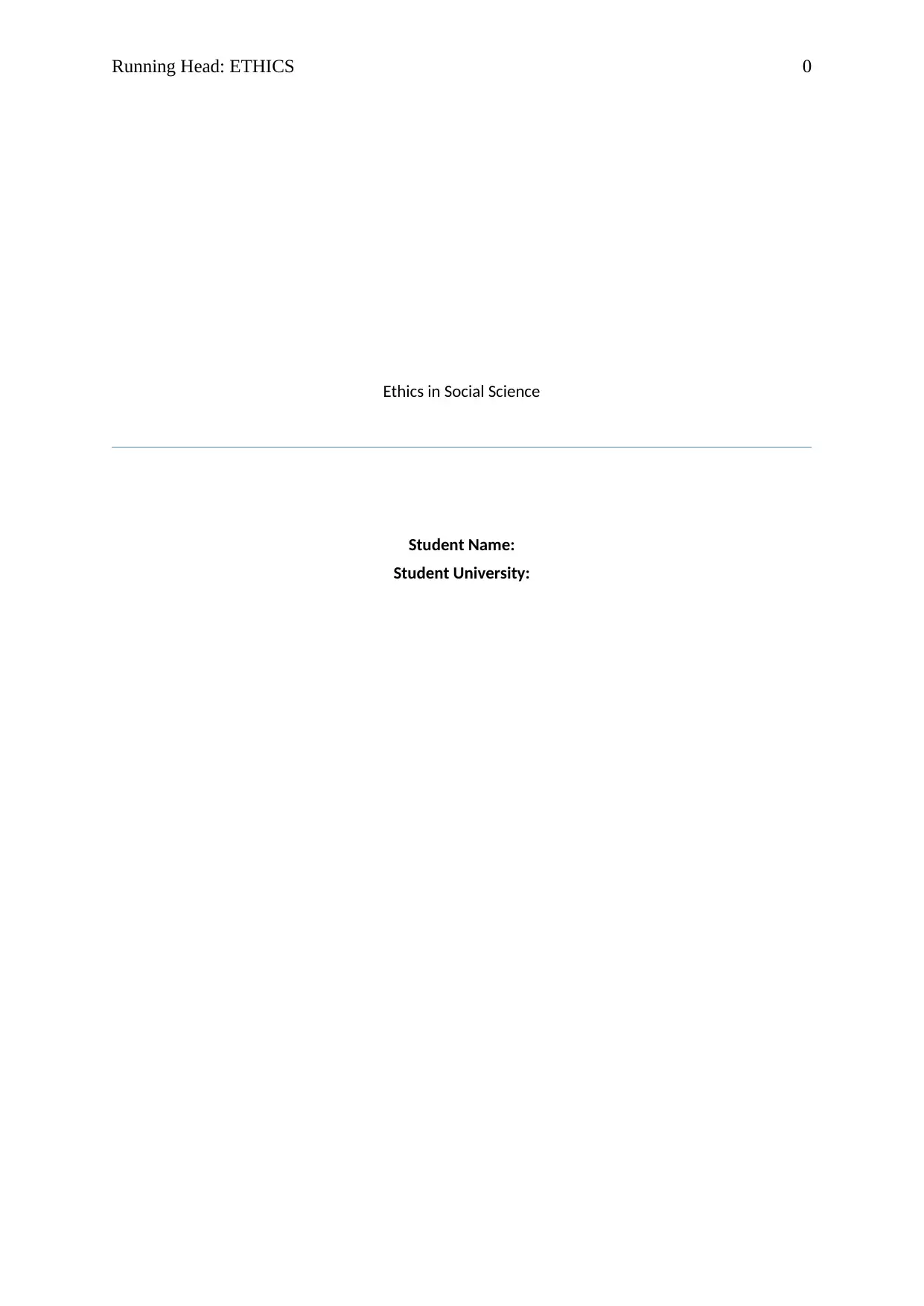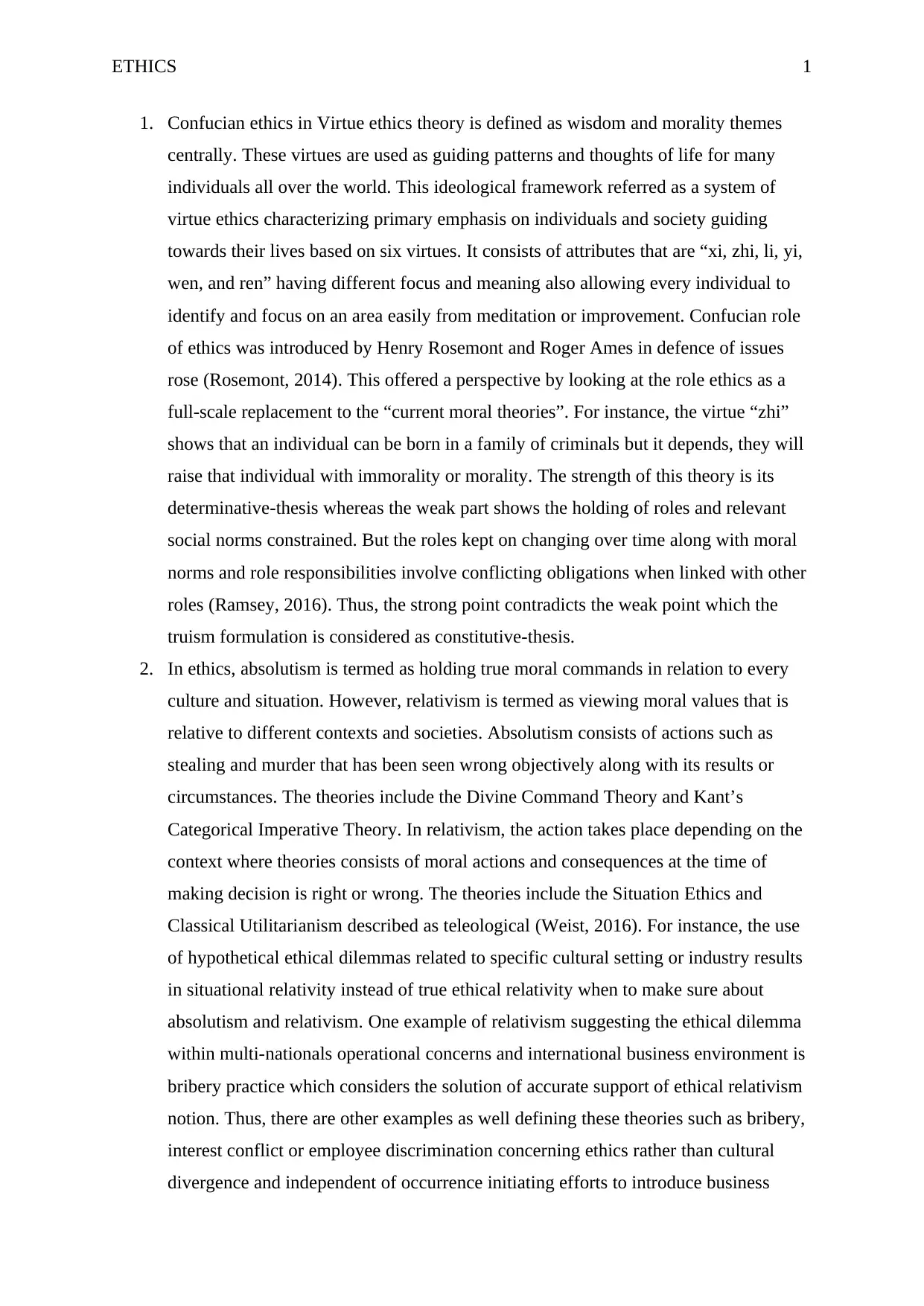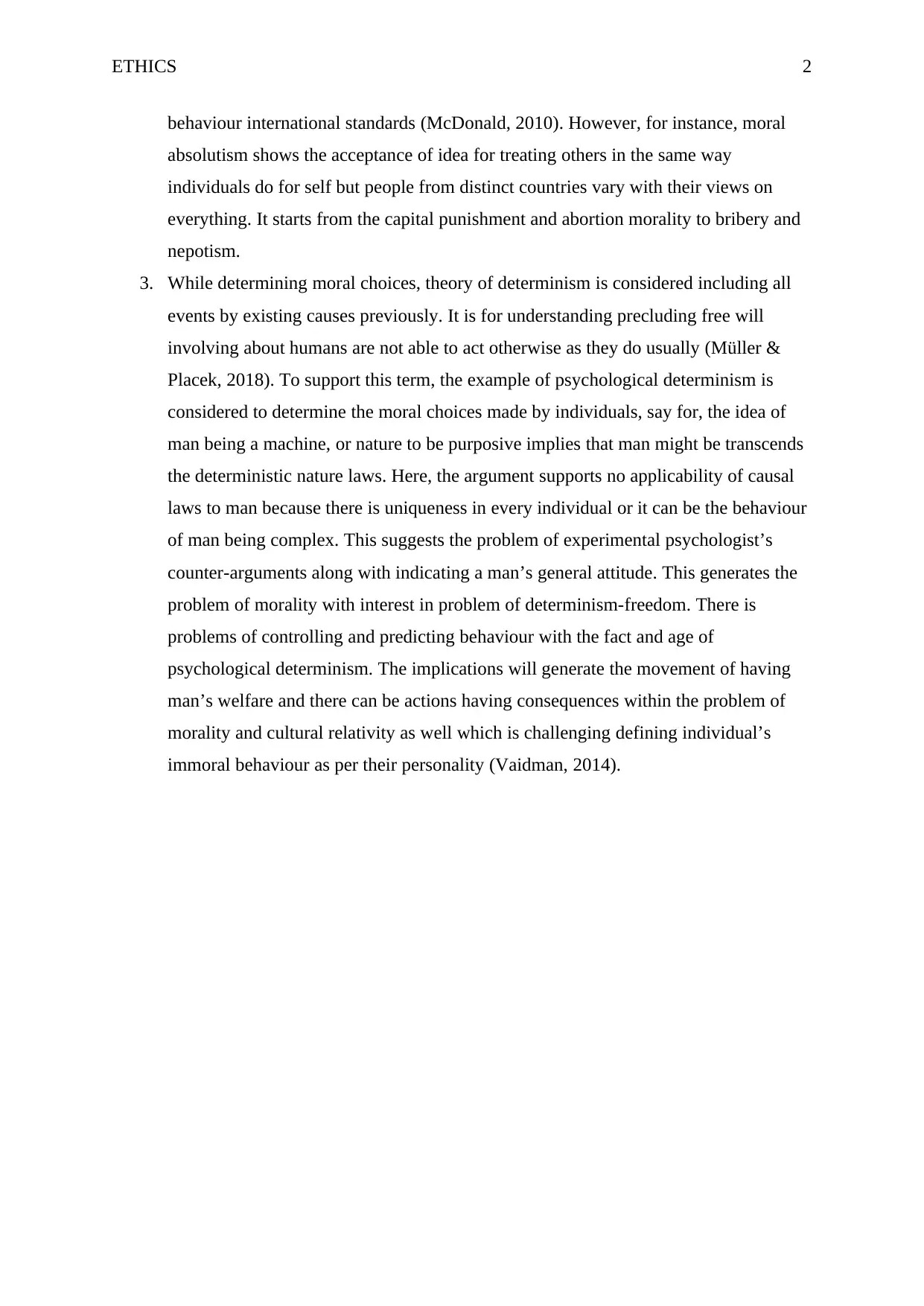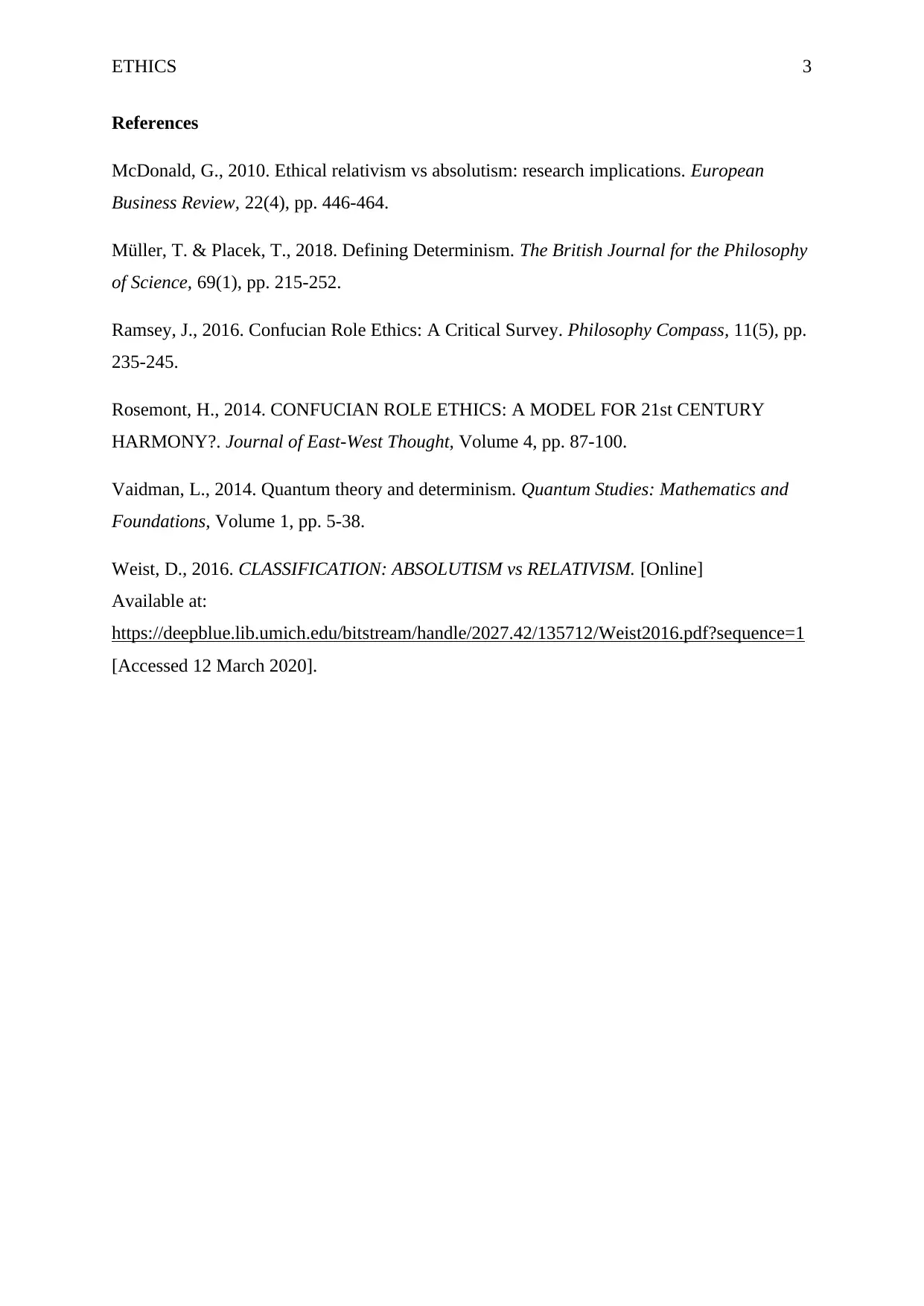University Ethics Course: Confucian Ethics and Ethical Theories
VerifiedAdded on 2022/08/19
|4
|940
|11
Essay
AI Summary
This essay delves into the realm of ethics within social science, focusing on Confucian ethics and virtue ethics as guiding principles. It explores the core virtues of Confucianism and their application in guiding individual and societal behavior. The essay contrasts absolutism and relativism, examining their implications in ethical decision-making, particularly within international business contexts. It further analyzes the concept of determinism and its impact on moral choices, considering psychological determinism and the complexities of free will. The essay references key scholars and theories, providing a comprehensive overview of ethical frameworks and their relevance to social science.

Running Head: ETHICS 0
Ethics in Social Science
Student Name:
Student University:
Ethics in Social Science
Student Name:
Student University:
Paraphrase This Document
Need a fresh take? Get an instant paraphrase of this document with our AI Paraphraser

ETHICS 1
1. Confucian ethics in Virtue ethics theory is defined as wisdom and morality themes
centrally. These virtues are used as guiding patterns and thoughts of life for many
individuals all over the world. This ideological framework referred as a system of
virtue ethics characterizing primary emphasis on individuals and society guiding
towards their lives based on six virtues. It consists of attributes that are “xi, zhi, li, yi,
wen, and ren” having different focus and meaning also allowing every individual to
identify and focus on an area easily from meditation or improvement. Confucian role
of ethics was introduced by Henry Rosemont and Roger Ames in defence of issues
rose (Rosemont, 2014). This offered a perspective by looking at the role ethics as a
full-scale replacement to the “current moral theories”. For instance, the virtue “zhi”
shows that an individual can be born in a family of criminals but it depends, they will
raise that individual with immorality or morality. The strength of this theory is its
determinative-thesis whereas the weak part shows the holding of roles and relevant
social norms constrained. But the roles kept on changing over time along with moral
norms and role responsibilities involve conflicting obligations when linked with other
roles (Ramsey, 2016). Thus, the strong point contradicts the weak point which the
truism formulation is considered as constitutive-thesis.
2. In ethics, absolutism is termed as holding true moral commands in relation to every
culture and situation. However, relativism is termed as viewing moral values that is
relative to different contexts and societies. Absolutism consists of actions such as
stealing and murder that has been seen wrong objectively along with its results or
circumstances. The theories include the Divine Command Theory and Kant’s
Categorical Imperative Theory. In relativism, the action takes place depending on the
context where theories consists of moral actions and consequences at the time of
making decision is right or wrong. The theories include the Situation Ethics and
Classical Utilitarianism described as teleological (Weist, 2016). For instance, the use
of hypothetical ethical dilemmas related to specific cultural setting or industry results
in situational relativity instead of true ethical relativity when to make sure about
absolutism and relativism. One example of relativism suggesting the ethical dilemma
within multi-nationals operational concerns and international business environment is
bribery practice which considers the solution of accurate support of ethical relativism
notion. Thus, there are other examples as well defining these theories such as bribery,
interest conflict or employee discrimination concerning ethics rather than cultural
divergence and independent of occurrence initiating efforts to introduce business
1. Confucian ethics in Virtue ethics theory is defined as wisdom and morality themes
centrally. These virtues are used as guiding patterns and thoughts of life for many
individuals all over the world. This ideological framework referred as a system of
virtue ethics characterizing primary emphasis on individuals and society guiding
towards their lives based on six virtues. It consists of attributes that are “xi, zhi, li, yi,
wen, and ren” having different focus and meaning also allowing every individual to
identify and focus on an area easily from meditation or improvement. Confucian role
of ethics was introduced by Henry Rosemont and Roger Ames in defence of issues
rose (Rosemont, 2014). This offered a perspective by looking at the role ethics as a
full-scale replacement to the “current moral theories”. For instance, the virtue “zhi”
shows that an individual can be born in a family of criminals but it depends, they will
raise that individual with immorality or morality. The strength of this theory is its
determinative-thesis whereas the weak part shows the holding of roles and relevant
social norms constrained. But the roles kept on changing over time along with moral
norms and role responsibilities involve conflicting obligations when linked with other
roles (Ramsey, 2016). Thus, the strong point contradicts the weak point which the
truism formulation is considered as constitutive-thesis.
2. In ethics, absolutism is termed as holding true moral commands in relation to every
culture and situation. However, relativism is termed as viewing moral values that is
relative to different contexts and societies. Absolutism consists of actions such as
stealing and murder that has been seen wrong objectively along with its results or
circumstances. The theories include the Divine Command Theory and Kant’s
Categorical Imperative Theory. In relativism, the action takes place depending on the
context where theories consists of moral actions and consequences at the time of
making decision is right or wrong. The theories include the Situation Ethics and
Classical Utilitarianism described as teleological (Weist, 2016). For instance, the use
of hypothetical ethical dilemmas related to specific cultural setting or industry results
in situational relativity instead of true ethical relativity when to make sure about
absolutism and relativism. One example of relativism suggesting the ethical dilemma
within multi-nationals operational concerns and international business environment is
bribery practice which considers the solution of accurate support of ethical relativism
notion. Thus, there are other examples as well defining these theories such as bribery,
interest conflict or employee discrimination concerning ethics rather than cultural
divergence and independent of occurrence initiating efforts to introduce business

ETHICS 2
behaviour international standards (McDonald, 2010). However, for instance, moral
absolutism shows the acceptance of idea for treating others in the same way
individuals do for self but people from distinct countries vary with their views on
everything. It starts from the capital punishment and abortion morality to bribery and
nepotism.
3. While determining moral choices, theory of determinism is considered including all
events by existing causes previously. It is for understanding precluding free will
involving about humans are not able to act otherwise as they do usually (Müller &
Placek, 2018). To support this term, the example of psychological determinism is
considered to determine the moral choices made by individuals, say for, the idea of
man being a machine, or nature to be purposive implies that man might be transcends
the deterministic nature laws. Here, the argument supports no applicability of causal
laws to man because there is uniqueness in every individual or it can be the behaviour
of man being complex. This suggests the problem of experimental psychologist’s
counter-arguments along with indicating a man’s general attitude. This generates the
problem of morality with interest in problem of determinism-freedom. There is
problems of controlling and predicting behaviour with the fact and age of
psychological determinism. The implications will generate the movement of having
man’s welfare and there can be actions having consequences within the problem of
morality and cultural relativity as well which is challenging defining individual’s
immoral behaviour as per their personality (Vaidman, 2014).
behaviour international standards (McDonald, 2010). However, for instance, moral
absolutism shows the acceptance of idea for treating others in the same way
individuals do for self but people from distinct countries vary with their views on
everything. It starts from the capital punishment and abortion morality to bribery and
nepotism.
3. While determining moral choices, theory of determinism is considered including all
events by existing causes previously. It is for understanding precluding free will
involving about humans are not able to act otherwise as they do usually (Müller &
Placek, 2018). To support this term, the example of psychological determinism is
considered to determine the moral choices made by individuals, say for, the idea of
man being a machine, or nature to be purposive implies that man might be transcends
the deterministic nature laws. Here, the argument supports no applicability of causal
laws to man because there is uniqueness in every individual or it can be the behaviour
of man being complex. This suggests the problem of experimental psychologist’s
counter-arguments along with indicating a man’s general attitude. This generates the
problem of morality with interest in problem of determinism-freedom. There is
problems of controlling and predicting behaviour with the fact and age of
psychological determinism. The implications will generate the movement of having
man’s welfare and there can be actions having consequences within the problem of
morality and cultural relativity as well which is challenging defining individual’s
immoral behaviour as per their personality (Vaidman, 2014).
⊘ This is a preview!⊘
Do you want full access?
Subscribe today to unlock all pages.

Trusted by 1+ million students worldwide

ETHICS 3
References
McDonald, G., 2010. Ethical relativism vs absolutism: research implications. European
Business Review, 22(4), pp. 446-464.
Müller, T. & Placek, T., 2018. Defining Determinism. The British Journal for the Philosophy
of Science, 69(1), pp. 215-252.
Ramsey, J., 2016. Confucian Role Ethics: A Critical Survey. Philosophy Compass, 11(5), pp.
235-245.
Rosemont, H., 2014. CONFUCIAN ROLE ETHICS: A MODEL FOR 21st CENTURY
HARMONY?. Journal of East-West Thought, Volume 4, pp. 87-100.
Vaidman, L., 2014. Quantum theory and determinism. Quantum Studies: Mathematics and
Foundations, Volume 1, pp. 5-38.
Weist, D., 2016. CLASSIFICATION: ABSOLUTISM vs RELATIVISM. [Online]
Available at:
https://deepblue.lib.umich.edu/bitstream/handle/2027.42/135712/Weist2016.pdf?sequence=1
[Accessed 12 March 2020].
References
McDonald, G., 2010. Ethical relativism vs absolutism: research implications. European
Business Review, 22(4), pp. 446-464.
Müller, T. & Placek, T., 2018. Defining Determinism. The British Journal for the Philosophy
of Science, 69(1), pp. 215-252.
Ramsey, J., 2016. Confucian Role Ethics: A Critical Survey. Philosophy Compass, 11(5), pp.
235-245.
Rosemont, H., 2014. CONFUCIAN ROLE ETHICS: A MODEL FOR 21st CENTURY
HARMONY?. Journal of East-West Thought, Volume 4, pp. 87-100.
Vaidman, L., 2014. Quantum theory and determinism. Quantum Studies: Mathematics and
Foundations, Volume 1, pp. 5-38.
Weist, D., 2016. CLASSIFICATION: ABSOLUTISM vs RELATIVISM. [Online]
Available at:
https://deepblue.lib.umich.edu/bitstream/handle/2027.42/135712/Weist2016.pdf?sequence=1
[Accessed 12 March 2020].
1 out of 4
Related Documents
Your All-in-One AI-Powered Toolkit for Academic Success.
+13062052269
info@desklib.com
Available 24*7 on WhatsApp / Email
![[object Object]](/_next/static/media/star-bottom.7253800d.svg)
Unlock your academic potential
Copyright © 2020–2026 A2Z Services. All Rights Reserved. Developed and managed by ZUCOL.



